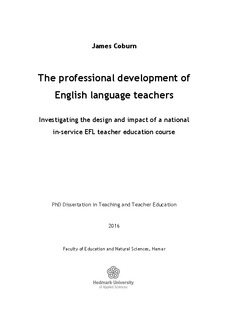| dc.description.abstract | This mixed-methods article-based study examines the professional development of a group of experienced primary school teachers who had taught English without any EFL teacher education. The teachers then took a one-year blended blended -mode in mode in -service service service service EFL teacher education course while working three days a week. The study compares course design and course impact on the teachers. The research was based at Hedmark University College in Hamar, with field work in different areas of Norway.
Article 1compares the design of the focus course with another course’s design within the same national programme and with the design of a locally-organised course. The methods included document analysis, interviews with course designers and field work. Article 2 used statistical analysis to assess significance of changes in teachers’ responses to identical pre-course and post-course questionnaires concerning their beliefs and self-reported practices. The teachers’ own reflections on changes in their responses formed the qualitative material supporting the statistical data. Article 3 consisted of case studies of four teachers, each with three school visits, classroom observations, recordings of teachers’ classroom language and interviews. The visits were early-course, late- course and post-course. Recordings and interviews were transcribed and analysed together with teachers’ written reflections, resulting in qualitative and quantitative data.
Findings indicate that teachers experienced increased competence as EFL teachers, used significantly more English in class, became less dependent on textbooks, and encouraged more pupil activity. Confidence in oral English proficiency generally increased but some hesitancy remained concerning grammatical errors. Teachers became more aware of deeper meanings of curriculum goals, leading to losses and increases in confidence. 5th–7th grade teachers face challenges with curriculum goals for teaching language-learning strategies, and for literature, culture and society. Teachers still find difficulty in teaching pronunciation goals.
After the course, many teachers face challenges because many English-teaching colleagues have no EFL teacher education and are not familiar with communicative language teaching methods. Weaknesses in course design include lack of follow-up and connection with teachers’ schools, and lack of opportunity for oral English practice and teacher collaboration between seminars. Implications include the need to better accommodate the online blended nature of the course and need for post-course follow-up. | nb_NO |
